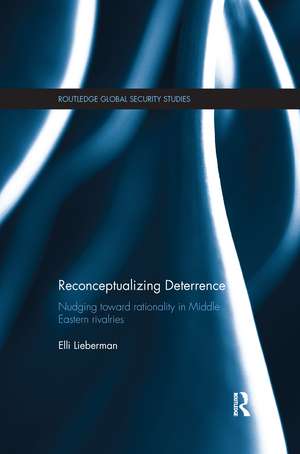Reconceptualizing Deterrence: Nudging Toward Rationality in Middle Eastern Rivalries: Routledge Global Security Studies
Autor Elli Liebermanen Limba Engleză Paperback – 20 iul 2016
The work argues that many of the problems encountered in the development of deterrence theory lay in the fact that it was developed during the Cold War, when the immediate problem it had to address was how to prevent catastrophic nuclear wars. The logic of nuclear deterrence compelled a preoccupation with the problem of stability over credibility; however, because the logic of conventional deterrence is different, the solution of the tension between credibility and stability is achieved by deference to credibility, due to the requirements of reputation and costly signaling.
This book aims to narrow the gap between theory and evidence. It explores how a reconceptualization of the theory as a process that culminates in the internalization of deterrence within enduring rivalries is better suited to account for its final success: a finding that has eluded deterrence theorists for long.
This interdisciplinary book will be of much interest to students of deterrence theory, strategic studies, international security, Middle Eastern studies and IR in general.
| Toate formatele și edițiile | Preț | Express |
|---|---|---|
| Paperback (1) | 389.38 lei 6-8 săpt. | |
| Taylor & Francis – 20 iul 2016 | 389.38 lei 6-8 săpt. | |
| Hardback (1) | 1060.25 lei 6-8 săpt. | |
| Taylor & Francis – 6 aug 2012 | 1060.25 lei 6-8 săpt. |
Din seria Routledge Global Security Studies
-
 Preț: 287.82 lei
Preț: 287.82 lei -
 Preț: 294.74 lei
Preț: 294.74 lei - 9%
 Preț: 1073.81 lei
Preț: 1073.81 lei -
 Preț: 326.49 lei
Preț: 326.49 lei -
 Preț: 325.30 lei
Preț: 325.30 lei -
 Preț: 462.81 lei
Preț: 462.81 lei -
 Preț: 492.53 lei
Preț: 492.53 lei -
 Preț: 465.53 lei
Preț: 465.53 lei -
 Preț: 130.92 lei
Preț: 130.92 lei -
 Preț: 481.58 lei
Preț: 481.58 lei - 14%
 Preț: 337.39 lei
Preț: 337.39 lei - 28%
 Preț: 820.73 lei
Preț: 820.73 lei -
 Preț: 416.96 lei
Preț: 416.96 lei - 18%
 Preț: 1052.85 lei
Preț: 1052.85 lei - 18%
 Preț: 1111.90 lei
Preț: 1111.90 lei - 28%
 Preț: 821.53 lei
Preț: 821.53 lei - 18%
 Preț: 1055.51 lei
Preț: 1055.51 lei - 16%
 Preț: 335.12 lei
Preț: 335.12 lei - 16%
 Preț: 324.86 lei
Preț: 324.86 lei - 18%
 Preț: 713.18 lei
Preț: 713.18 lei - 28%
 Preț: 821.14 lei
Preț: 821.14 lei - 18%
 Preț: 729.62 lei
Preț: 729.62 lei - 28%
 Preț: 851.27 lei
Preț: 851.27 lei - 18%
 Preț: 1165.87 lei
Preț: 1165.87 lei - 28%
 Preț: 825.25 lei
Preț: 825.25 lei - 18%
 Preț: 1112.21 lei
Preț: 1112.21 lei - 49%
 Preț: 542.69 lei
Preț: 542.69 lei - 18%
 Preț: 1071.66 lei
Preț: 1071.66 lei - 25%
 Preț: 852.88 lei
Preț: 852.88 lei -
 Preț: 430.37 lei
Preț: 430.37 lei - 18%
 Preț: 1118.46 lei
Preț: 1118.46 lei - 28%
 Preț: 819.50 lei
Preț: 819.50 lei - 18%
 Preț: 1057.40 lei
Preț: 1057.40 lei -
 Preț: 413.33 lei
Preț: 413.33 lei - 28%
 Preț: 823.17 lei
Preț: 823.17 lei - 30%
 Preț: 849.29 lei
Preț: 849.29 lei - 18%
 Preț: 1060.25 lei
Preț: 1060.25 lei - 18%
 Preț: 1123.68 lei
Preț: 1123.68 lei - 28%
 Preț: 820.16 lei
Preț: 820.16 lei
Preț: 389.38 lei
Nou
Puncte Express: 584
Preț estimativ în valută:
74.53€ • 80.98$ • 62.65£
74.53€ • 80.98$ • 62.65£
Carte tipărită la comandă
Livrare economică 21 aprilie-05 mai
Preluare comenzi: 021 569.72.76
Specificații
ISBN-13: 9781138200654
ISBN-10: 1138200654
Pagini: 328
Dimensiuni: 156 x 234 mm
Greutate: 0.45 kg
Ediția:1
Editura: Taylor & Francis
Colecția Routledge
Seria Routledge Global Security Studies
Locul publicării:Oxford, United Kingdom
ISBN-10: 1138200654
Pagini: 328
Dimensiuni: 156 x 234 mm
Greutate: 0.45 kg
Ediția:1
Editura: Taylor & Francis
Colecția Routledge
Seria Routledge Global Security Studies
Locul publicării:Oxford, United Kingdom
Public țintă
General, Postgraduate, and ProfessionalCuprins
1. Theoretical Considerations 2. The Israeli-Egyptian Rivalry, 1948-1973 Part I: From Failure to Success, 1948-1967 Part II: Turning Point: The Six-Day War Part III: "Design Around I": The War of Attrition Part IV: "Design Around II" The Yom Kippur War 3. The Israeli-Hezbollah Rivalry Conclusion
Notă biografică
Elli Lieberman is a Lecturer on International Relations at the Missouri State University, Department of Defense and Strategic Studies and at Loyola University Maryland. His work has appeared in Security Studies, the Institute for National Strategic Studies, and several books. He is a MacArthur Scholar recipient.
Recenzii
"Lieberman challenges traditional deterrence theory, arguing that the concepts developed to explain Cold War rivalries are not suitable for non-nuclear (conventional) deterrence. He uses as case studies the Egyptian-Israeli rivalry up to 1973 and the tension between Israel and Hezbollah." - Survival
"Looking at deterrence theory and history through the lens of “a learning process,” as is so well detailed in this book, will enable the strategic thinker to see beyond solitary military crises and find the reasons behind periods of stability. Reconceptualizing Deterrence adds greatly to our understanding not only of the Middle East, but of deterrence in general, and the painstaking process it takes to maintain it." - Matthew R. Costlow
"This thoughtful study, which centers primarily on the Israel–Egypt relationship, offers a convincing response to the literature on conventional deterrence...this well-written, nicely organized, and judiciously argued book brings insights to an important subject. Its lasting relevance is clear in the short penultimate chapter that explores the deterrence relationship that appears to have emerged between Israel and Hezbollah after their 2006 confrontation in Lebanon."-- PSQ
"The book is a major contribution to the literature on conventional deterrence… . It is a significant contribution to the field of Security Studies. Its value lies in its revitalization of conventional discourse of Security Studies wherein the State is the key referent object. It also reestablishes the logic of political realism by locating the security problematique in the context of the State, dilemmas of its survival and the interface between political strategy and military capability for the protection of its cartographic identity.' --E-IR
"Looking at deterrence theory and history through the lens of “a learning process,” as is so well detailed in this book, will enable the strategic thinker to see beyond solitary military crises and find the reasons behind periods of stability. Reconceptualizing Deterrence adds greatly to our understanding not only of the Middle East, but of deterrence in general, and the painstaking process it takes to maintain it." - Matthew R. Costlow
"This thoughtful study, which centers primarily on the Israel–Egypt relationship, offers a convincing response to the literature on conventional deterrence...this well-written, nicely organized, and judiciously argued book brings insights to an important subject. Its lasting relevance is clear in the short penultimate chapter that explores the deterrence relationship that appears to have emerged between Israel and Hezbollah after their 2006 confrontation in Lebanon."-- PSQ
"The book is a major contribution to the literature on conventional deterrence… . It is a significant contribution to the field of Security Studies. Its value lies in its revitalization of conventional discourse of Security Studies wherein the State is the key referent object. It also reestablishes the logic of political realism by locating the security problematique in the context of the State, dilemmas of its survival and the interface between political strategy and military capability for the protection of its cartographic identity.' --E-IR
Descriere
This book offers a reconceptualisation of conventional deterrence theory, and applies it to enduring rivalries in the Middle East.


















